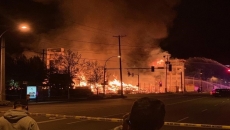COVID-19 has thrown yet another wrench in the long overdue construction of new ships for the navy and coast guard, say top military and procurement officials, adding the full scope of the damage won't be known until after the pandemic.
The federal government has invested billions of dollars over the past decade into replacing Canada's aging navy and coast guard fleets with dozens of new ships, including icebreakers, warships and support vessels.
Yet the effort has been plagued with numerous cost overruns and delays, which federal procurement department deputy minister Bill Matthews on Tuesday blamed on overly optimistic planning at the outset of the multibillion-dollar project.
"The initial schedules way back when were indeed not realistic," he told the House of Commons public accounts committee. "As time marched on and people realized that those initial schedules just weren't going to hold, there were adjustments made."
Those shortcomings were recently flagged in a damning report from Canada's auditor general, who warned in February that the problems could leave the navy and coast guard without ships as older vessels are retired before replacements arrive.
That report was produced before COVID-19, and Defence Department deputy minister Jody Thomas told the committee that work on all of the new vessels has since been further delayed to various degrees by the pandemic.
While Thomas suggested the government has since started to make up some of the lost ground, she added: "We cannot yet know the full impacts of COVID on shipbuilding timelines."
"This is another difficult reality of COVID. Until we are over the pandemic we will not have a complete and accurate picture of what the full impact has been, including anticipated delays on major procurement," she said.
Officials insisted the navy and coast guard are taking measures to ensure their existing ships can remain in the water until replacements arrive, including refits and upgrades to vessels that are in some cases already more than 50 years old.
The bureaucrats could not immediately say how much money was being invested in the different coast guard and navy fleets to keep them floating.
But Matthews acknowledged that doing so will in many cases result in "substantial" additional costs to the government, even as officials acknowledged that further delays to the construction of new vessels adds to their price tags.
"Across the board, the older the ships get, the (greater the) increase in maintenance costs," he said. "And it's quite substantial."
The officials also revealed that 10 years after they were tapped to build the new vessels, neither Seaspan Shipyards in Vancouver nor Halifax-based Irving Shipbuilding have yet improved their facilities to the point where they meet international standards.
That is despite the federal government having required achievement of such a "target state" as a condition for winning the work.
Public Services and Procurement Canada assistant deputy minister Simon Page said the government is working on "corrective action plans" to get the two shipyards to the required state.
Officials went on to suggest that failure is contributing to the delay in finalizing Quebec-based Chantier Davie's addition as the third yard in the shipbuilding strategy, as the government wants to make sure it can meet the requirement.
Despite the delays, Thomas said the government remains on track to build a fleet of 15 new warships to replace the navy’s existing Halifax-class frigates for around $60 billion. The parliamentary budget officer has pegged the cost at around $77 billion.
Coast guard officials also defended the Liberal government’s recent decision to build two polar icebreakers instead of only one, as was originally planned, and to distribute them between Seaspan and Davie.
While some critics have suggested the move was intended to head off any political fallout ahead of a federal election, Fisheries and Oceans Canada deputy minister Timothy Sargent said the two vessels are needed.
Matthews added that the decision to split the work between two yards followed a "rigorous evaluation" that showed doing so would result in the fastest and most efficient delivery while maximizing the project's economic benefits.





.jpg)
